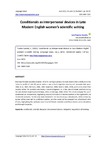Conditionals as interpersonal devices in Late Modern English women’s scientific writing

Use this link to cite
http://hdl.handle.net/2183/34126
Except where otherwise noted, this item's license is described as Atribución-NoComercial 4.0 Internacional
Collections
- Investigación (FFIL) [884]
Metadata
Show full item recordTitle
Conditionals as interpersonal devices in Late Modern English women’s scientific writingAuthor(s)
Date
2023Citation
Puente-Castelo, L. (2023). Conditionals as interpersonal devices in Late Modern English women’s scientific writing. Language Value, 16(1), 68-92. https://doi.org/10.6035/languagev.7229
Abstract
[Abstract] It is widely recognised that attaining best possible reception of one’s writing within the scientific community is among the main factors that contribute to the rhetorical profile of scientific prose. Authors not only have to negotiate meaning but also to persuade their peers (Allen, Qin & Lancaster, 1994; Atkinson 1996, 1999; Bazerman, 1988; Hyland, 1998, 2000). This is perhaps most remarkable when the position within the scientific community is disadvantageous, as in the case of female scientists during the Late Modern English period. (Crespo, 2012; Schiebinger, 1989, 2003).
Conditionals present an array of functions of an interpersonal nature, these used to negotiate meaning or to achieve a better reader response. Whether they are used to state shared assumptions, to narrow the scope or mitigate the force of a claim, to show humility by rhetorically doubting one’s own wording or underlining one’s uncertainty, or to directly express politeness, conditionals can be characterised as “rhetorical device[s] for gaining acceptance for one’s claims” (Warchal, 2010, p. 141).
The aim of this article is to analyse the use of conditionals as interpersonal, negotiating devices in the work of female scientists in the eighteenth and nineteenth centuries. To this end, texts written by women included in the Coruña Corpus of English Scientific Writing (Moskowich, 2011) will be searched for conditional markers, and the results will be analysed from a functional point of view, highlighting the particular ways in which female scientists used these devices across disciplines and through the period.
Keywords
Conditionals
Scientific discourse
Interpersonal devices
Mitigation
Negotiation of meaning
Scientific discourse
Interpersonal devices
Mitigation
Negotiation of meaning
Editor version
Rights
Atribución-NoComercial 4.0 Internacional
ISSN
1989-7103






